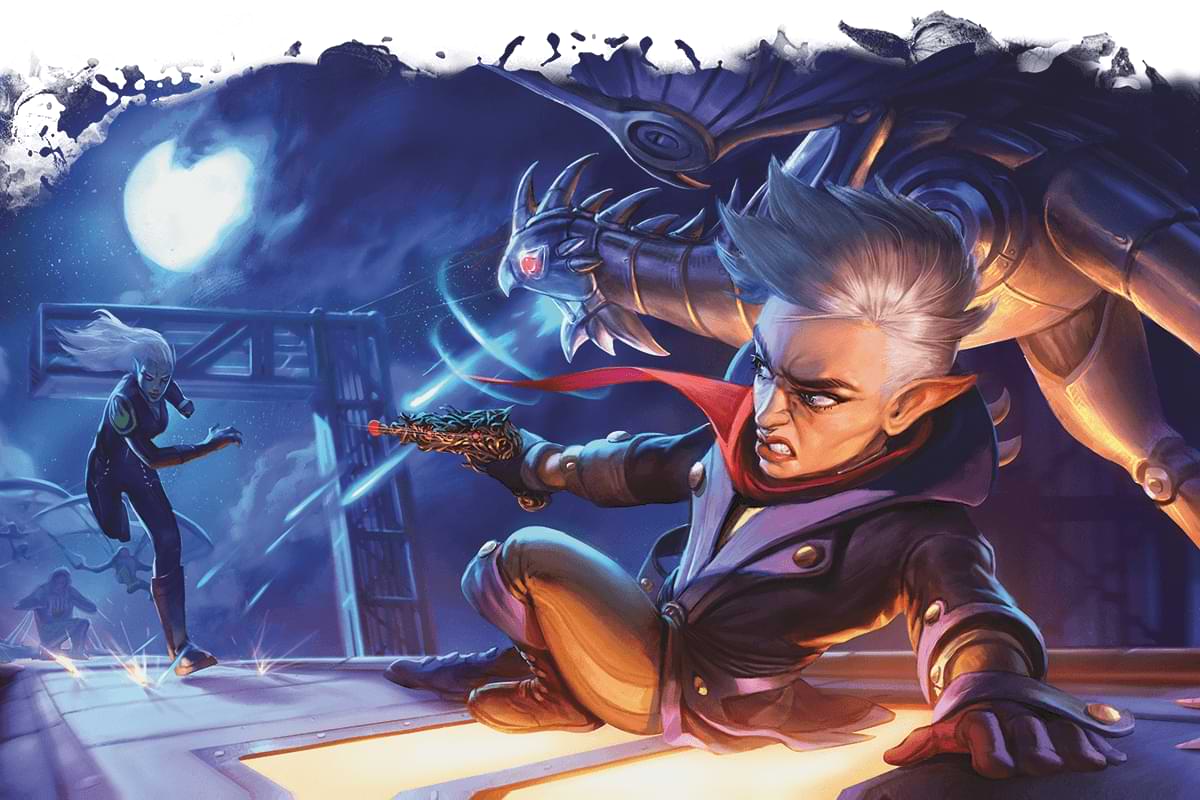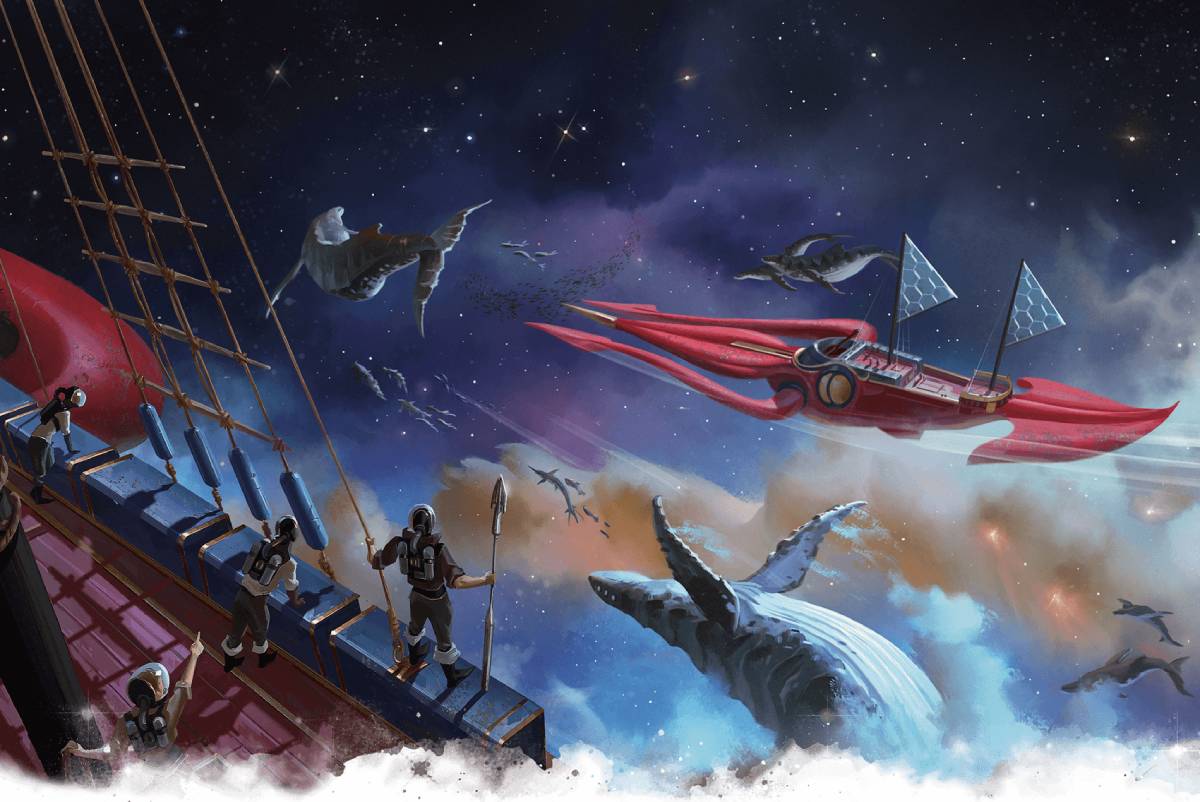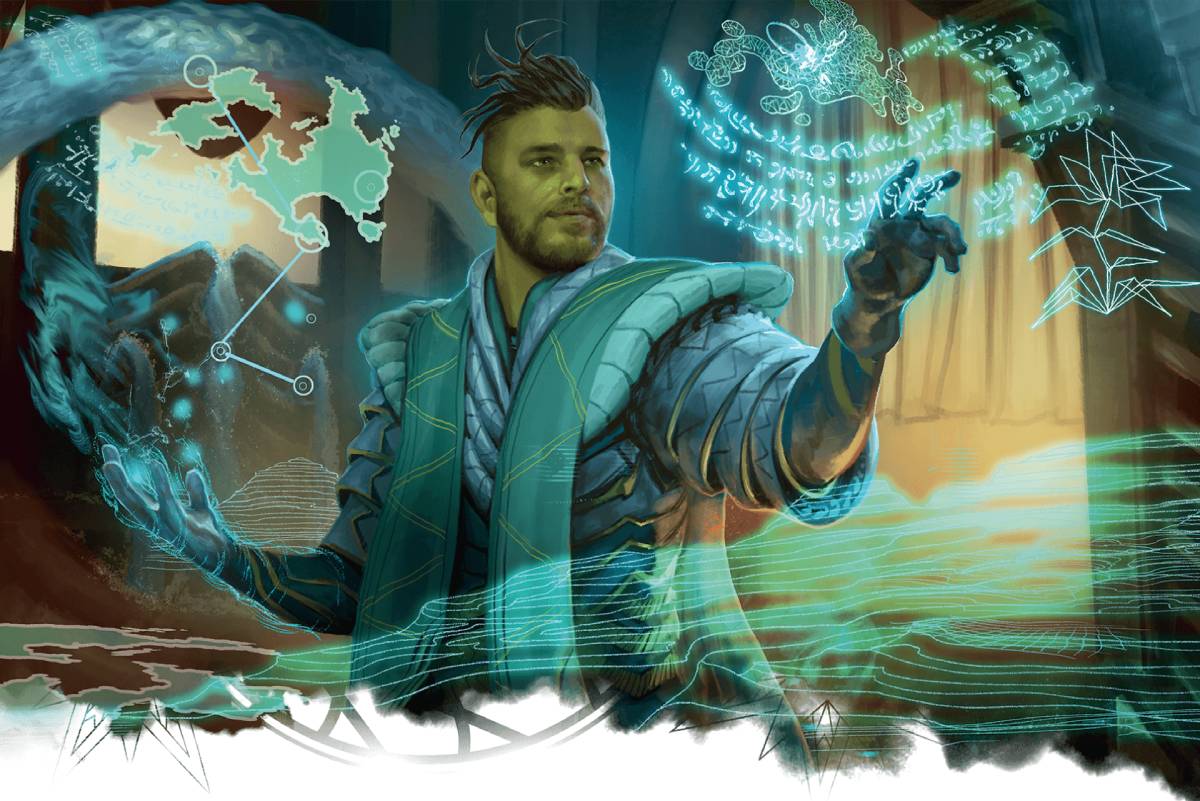May the 4th be with you, adventurers! Like many D&D players, I've grown up with a similar love of Star Wars. Many of the same genre-blending elements of George Lucas's space opera are the same things I've adored about my favorite D&D games. This is no surprise, of course, as even the Dungeon Master's Guide points out that elements of science fiction are deep in D&D's roots.
Today, I want to help you with finding ways to add elements of the sci-fi stories you love into your D&D games.
- Why Bring Sci-Fi Into D&D?
- Rules Offered to Dungeon Masters for Sci-Fi Elements
- Sci-Fi Tropes in Fantasy Settings
- Published D&D Resources
Why Bring Sci-Fi Into D&D?

If Dungeons & Dragons is a fantasy roleplaying game, why bring sci-fi elements into it at all? The simplest, most honest answer is because we can and because it's fun. As a cooperative storytelling game, D&D is primed to tell the kind of blended stories that the table is in the mood for.
Many fans of fantasy also grew up on a steady diet of science fiction stories and sometimes want to pull in elements from those tales without having to completely shift gears in a game. Many of our favorite stories exist as a mashup of two genres we love. Sometimes we like seeing knights cross laser swords in a space fortress, misbehaving cowboys riding horses into the cargo bay of their rustbucket planet hopper, or humans and astral elves debating the merits of logic while exploring worlds that may be strange or new.
Rules Offered to Dungeon Masters for Sci-Fi Elements
If you're a DM just looking to add some sci-fi elements into your games without completely revamping the game or playing a different system, here are resources from official D&D books that can be utilized or combined with your own homebrew settings or plans.
The Dungeon Master's Workshop
Chapter 9 of the Dungeon Master's Guide contains a plethora of optional D&D rules that are intended to help DMs customize their games to fit different tropes, tones, and play styles.
Elements that could directly come into play in sci-fi encounters include:
- Laser and Antimatter Weapons: Damage and properties for three types of futuristic weapons, as well as damage types that best replicate the effects of their attacks, can be found here.
- Alien Technology: Here are rules for how characters can interact with and attempt to understand advanced technology they discover.
- Rest Variants: These options give you tips to speed up or slow down how quickly your characters can be up on their feet after a rest. The Epic Heroism option, which speeds up recovery, could simulate recovery chambers or other technologies which replace the need for a good night's sleep. Conversely, the Gritty Realism option could help simulate the long stretches of time it takes a ship to travel between worlds.
- Healing Variants: Similar to rests, these optional rules can reflect technologies that make healing more or less difficult. Adding a healer's kit dependency could reflect the need for a trained medical officer; allowing healing surges could suggest the use of medical stimpacks or sprays; and the Slow Natural Healing option is intended to give a game a more realistic vibe by removing the automatic healing provided by a long rest.
Sci-Fi Tropes in Fantasy Settings

The beauty of storytelling is that you can often pull the types of stories you like from one genre into a different one altogether. A great recent example of this is The Adventure Zone podcast's Ethersea arc. DM Griffin McElroy took the tropes he wanted to explore in a space opera setting and moved them underwater into a D&D campaign centered around domed cities and arcane submarines.
To that end, here is a selection of the most popular tropes in science fiction stories with suggestions for how you could tell these stories in a D&D fantasy campaign without firing a single phaser.
Exploring Alien Worlds
While the many species of the D&D worlds have long since intermingled in common settings, this doesn't have to be the case. A campaign of all or mostly humans setting out to explore a wider world for the first time is a perfect way to play out the "stranger in a strange land" trope popular in sci-fi. If you want to heighten the "alien environment" element a bit more, send your players into realms outside the Material Plane, such as the elemental planes, the Feywild, or the Shadowfell. These types of tales have a basis in fantasy anyway, evoking such literary classics as The Odyssey or Gulliver's Travels.
Alien Invasions
The D&D multiverse has plenty of opportunities for invaders from other realms to pose a sudden and terrifying threat. Mind flayers could use intellect devourers to replace allies and leaders ahead of their arrival. Gods, dragons, or giants descending from on high could serve as stand-ins for imposing, destructive spaceships.
Dystopias
Dystopian worlds in sci-fi settings often rely on technocratic themes that allow for surveillance states and oppressive control from ruling factions, but many of those elements can easily be swapped out for magical items or spells. Tyrannical hegemonies can come in the form of powerful sorcerers, maliciously charismatic leaders, or even the classic dragon. Amping up the intimidation factor of guards leaning into stories about factions such as the Harpers can help draw notes of familiar settings and their plucky rebel alliances.
Bizarre Creations and Technological Terrors
Artificer automatons, laboratories of mad mages, aberrant beings summoned in ill-fated rituals, all of these can be used to replicate the sense of terror from science experiments gone wrong, of deadly creations that must be stopped, or sympathetic golems whose mere existence causes dread in local torch-wielding villagers who may in fact, be the real monsters.
The crashed ruins of the floating city of Aeor in Wildemount is an excellent example of a fantasy setting scarred by mages whose hubris led to catastrophe. The Frozen Sick adventure in Explorer's Guide to Wildemount has your characters deal with the impact of the mysterious Aeorian disease, the frigid woe, when it infects a local village.
Impact of Advanced Technology
A hallmark of many science fiction stories is how technology alters the world around us. Often a new technology has had beneficial effects on the world but has had some unforeseen negative impacts on it as well. Infusing technology with magic is an excellent tool for replicating the advanced science of many futuristic stories. Explore how that magic could be causing issues such as a drain on arcane energies, or be leading toward a worldwide catastrophe, as in Ethersea, where the abuse of magic led to the world's surface lands becoming uninhabitable. Similarly, the world of Eberron deals with the fallout of the magical war that ripped its surface apart, and Critical Role's Calamity arc showcases how the best intentions of powerful magical researchers led to the apocalyptic events that still impact the world almost 1,000 years later.
Revisiting our pal, the Dungeon Master's Guide can be a big help in these kinds of stories, as the detailed advice on adventures set in extreme environments is a perfect resource for the kinds of disaster-strewn worlds that could be created by unchecked technological advances.
Time Travel or Parallel Universes
The school of dunamancy magic found in Explorer's Guide to Wildemount is essentially quantum mechanics in magical form. We've already seen with the Echo Knight fighter subclass that this form of magic deals with unrealized probabilities and the strings of alternate identities. A storyline revolving around an intensifying or shattering source of dunamis could cause scenarios like time loops, characters getting stuck in alternate timelines, or caught somewhere in history just desperate to find their way home.
Published D&D Resources

If you're looking for some published campaign settings or resources for adding sci-fi elements or tropes into your games with little modifications, here are some resources you can find in official D&D sources:
- Spelljammer: Adventures in Space: It's kind of right there on the tin, isn't it? While the Astral Plane and Wildspace definitely fall a bit outside the "science" part of science fiction, spelljamming allows for exploration of many of the elements of sci-fi stories, or perhaps more accurately, of space opera stories especially, without any need to homebrew a setting. Plus, even if your player characters never leave their own planet, the Astral Plane allows for plenty of storytelling opportunities for alien beings to visit them.
- Van Richten's Guide to Ravenloft: Many of the Domains of Dread found in Ravenloft are crafted in homage to the classics of science fiction. Mad science, constructed threats, environmental disasters, animal hybrids, and other inspirations can be found in these domains.
- Eberron: Rising from the Last War: Magic has seeped into technology in the world of Eberron, taking many of the most recognizable elements of D&D and shifting it into a pulp adventure setting that just might be the exact thing to scratch that sci-fi itch while still keeping your feet firmly planted in a fantasy world.
- Guildmasters' Guide to Ravnica: The planet-spanning city of Ravnica is a great setting to evoke that vibe of a sprawling, unending metropolis choked by bureaucracy and faction politics. Centering your stories around the Izzet League offers the potential for tales of elaborate workshops and research gone haywire. Meanwhile, tales of the Simic Combine and their hybrids could allow for The Island of Dr. Moreau-type hybrids and other biological nightmares.
- Baldur's Gate: Descent into Avernus: You can't find a much more defined wasteland setting in D&D than the first layer of the Nine Hells. For those looking specifically for that desolate, post-apocalyptic survival story, Avernus and its rampaging infernal war machines are a good place to start.
Set Phasers to Fun
This is merely a taste of the ways sci-fi can be worked into your games, either through similar storytelling methods or through the full-on inclusion of advanced technologies. Hopefully, these suggestions can help inspire you to more ways to think outside the box in your games or build on ideas you've already been brewing. Either way, I hope you've got a good feeling about this.
Riley Silverman (@rileyjsilverman) is a contributing writer to D&D Beyond, Nerdist, and SYFY Wire. She DMs the Theros-set Dice Ex Machina for the Saving Throw Show, and has been a player on the Wizards of the Coast-sponsored The Broken Pact. Riley also played as Braga in the official tabletop adaptation of the Rat Queens comic for HyperRPG, and currently plays as The Doctor on the Doctor Who RPG podcast The Game of Rassilon. She currently lives in Los Angeles.








-
View User Profile
-
Send Message
Posted May 16, 2023Cool
-
View User Profile
-
Send Message
Posted May 17, 2023If you have a campaign, please add Geraldo the Etherwalker (tall and deathly pale, can go between space and time) merchant. He will sell anything for a 10% upkeep.
-
View User Profile
-
Send Message
Posted May 17, 2023fall out would be an interesting vibe for a D&D campaign what sort of story would you go for after the fallout event and the characters come out of the vault
-
View User Profile
-
Send Message
Posted May 21, 2023Is ccol
-
View User Profile
-
Send Message
Posted May 23, 2023Well the radiation could have changed peoples DNA and people could have developed a form of magic otherwise unknown before the final days. Or possibly the FO world is one of the many dimensions of space and time that exist and the resulting nuclear explosions have opened a portal between the realities.
-
View User Profile
-
Send Message
Posted May 25, 2023Not to throw shade on the writer of this article, but to me, Spelljammer and Eberron have never quite felt like sci fi. They both strike a balance of fantasy and tech/magitech that feels good, but they are, in my opinion, more fantasy than sci fi. A lot of the class features are too magical and fantasy for it to really work as full sci fi. It feels like homebrew is the only option to get a really sci fi vibe out of D&D.
Or maybe I'm too particular as to what counts as sci fi. I dunno.
-
View User Profile
-
Send Message
Posted May 25, 2023Yeah, 5e as it stands isn't a great system for a sci-fi setting. What baffles me about that is that if the writers put half the energy into creating a variant system of D&D especially for sci-fi? Now that would be far, far more interesting that One D&D or even any of the more recent books they've published.
Imagine a D&D Western, D&D Sci-Fi and other genre skins? Now that would be interesting.
-
View User Profile
-
Send Message
Posted May 25, 2023I agree! It feels so odd to me that the D&D team doesn't put much energy into anything new. They stick to fantasy which makes sense for a fantasy game, but they rely entirely on the fanbase to create sci fi, western, even seafaring adventures, which while it would take a lot of work, I feel like there would be a huge payoff. Or even just a different strain of fantasy. If WotC has to resort to complete rewrites of the lore and character options, perhaps it's time to start a new setting to work on. Low fantasy, seafaring, and to some extent western genres can completely work with most of the rules D&D already has, and are all under-represented genres in D&D. Sci fi would be much harder to work into D&D, because sci fi usually doesn't have straight-up magic, instead having tech that's so powerful it can function like magic, but it's near-impossible to fit a wizard into a sci fi. But it still could work, it would just require new classes and restrictions on what classes can be used, which may end up as to large a cost. I'm not sure. I'm not an expert on this stuff.
-
View User Profile
-
Send Message
Posted May 27, 2023For sci-fi-skinned 5E check out the following 3rd party systems:
Everyday Heroes is actually a modern game (i.e., d20 Modern reboot), but provides the foundation for a lot of great near-future style sci-fi games or urban fantasy games.
-
View User Profile
-
Send Message
Posted Jun 2, 2023I also suggest the Borderlands games.
-
View User Profile
-
Send Message
Posted Jun 3, 2023can i also add Warhammer into my campaign?
-
View User Profile
-
Send Message
Posted Jun 5, 2023I added space dwarves (inspired by images from WH40k) to a space-themed campaign in Spelljammer. If there are elves, why not dwarves?
-
View User Profile
-
Send Message
Posted Jun 8, 2023In my current campaign, I've added hints to an ancient alien civilisation that died out, there are some remnants of their technology but most of it is ruined,
-
View User Profile
-
Send Message
Posted Jun 13, 2023I think Halo would also be a great idea
-
View User Profile
-
Send Message
Posted Jun 14, 2023The recent System Shock remake has me drooling at the idea of recreating that setting in dnd.
-
View User Profile
-
Send Message
Posted Jun 15, 2023Just make a stat block?
I'm with you on this one.
-
View User Profile
-
Send Message
Posted Jul 13, 2023For one of my first times playing dnd, we did a futuristic campaign. I played a robotic spider bounty hunter with taser webs. It was fun, but one of our characters turned into a murder hobo.
-
View User Profile
-
Send Message
Posted Feb 12, 2025